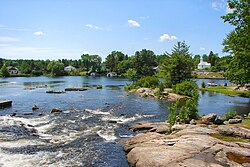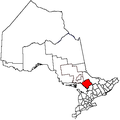Magnetawan | |
|---|---|
| Municipality of Magnetawan | |
 Magnetawan on the Magnetawan River | |
| Coordinates: 45°40′N 79°38′W / 45.667°N 79.633°W | |
| Country | Canada |
| Province | Ontario |
| District | Parry Sound |
| Settled | 1870s |
| Incorporated | January 1, 1998 |
| Government | |
| • Type | Township |
| • Mayor | Sam Dunnett |
| • Federal riding | Parry Sound-Muskoka |
| • Prov. riding | Parry Sound—Muskoka |
| Area | |
| • Land | 526.31 km2 (203.21 sq mi) |
| Population (2021)[1] | |
• Total | 1,753 |
| • Density | 3.3/km2 (9/sq mi) |
| Time zone | UTC-5 (EST) |
| • Summer (DST) | UTC-4 (EDT) |
| Postal Code | P0A |
| Area code | 705 |
| Website | magnetawan |
Magnetawan is a township in the Almaguin Highlands region of the Parry Sound District in the Canadian province of Ontario. The Township of Magnetawan was formed in 1998 through the amalgamation of the former Township of Chapman and the former Village of Magnetawan, along with the unincorporated geographic townships of Croft and Spence.
The word Magnetawan in the Algonquin language means "swiftly flowing river."[2]
Barbara Hanley, the first woman ever elected mayor of a community in Canada, was born in Magnetawan in 1882.
Magnetawan is the setting for The Rogue Hunter, the tenth book in the popular Urban Fantasy Argeneau series by Ontario-born author Lynsay Sands.
The community is twinned with the city of Baltimore, Maryland.[citation needed]
History
The first people to inhabit the region were the Hurons, Ojibway and Algonquins, who would visit the area in the summer for hunting and fishing but sheltered on Georgian Bay in the winter. While some Europeans explored the region in the early 19th century, settlement and colonization by Europeans was hardly taking place, so much so that the government considered turning the entire region into an Indian reserve.[3]
But when pine stands in southern Ontario became depleted, the area attracted loggers and the government changed its mind and encouraged settlement through free land grants, first offered in 1853. Settlement happened slowly but accelerated when the colonization road from Rosseau to Nipissing began being built in 1866.[3] In 1868, the government passed the Free Grand Land and Homestead Act and began advertising this extensively in European countries to attract new immigrants.[4] Croft Township was surveyed in 1869, Chapman Township in 1870, and the village of Magnetawan was mapped out in 1873.[5]
The Great North Road, from Parry Sound to Nipissing, reached the Magnetawan at Ahmic Harbour in 1870.[6] The 76 miles (122 km) stretch of the colony road from Rousseau to Nipissing reached the Magnetawan in 1874, where the historic village of Magnetawan was built.[6] In 1879 a pair of small steamships started carrying cargo and passengers over the 20 miles (32 km) reach from the rapids at the village upstream to Burk's Falls.
Burk's Falls was linked to the south by a railroad in 1885.[6] A lock was completed, enabling navigation west of the rapids at the historic village of Magnetawan, in 1886. Following its completion larger steamships started carrying cargo and passengers, and towing log booms, over the reach from Burk's Falls to Ahmic Harbour. During its first 25 years of operation the lock-keeper recorded steamships transited the lock 17,590 times. The last steamship, a tugboat used to tow log-booms, used the river in 1934.
Geography
Core rock samples done by Walfried Schwerdtner in the surrounding area, show mostly foliated Grenville Gneiss.[7]
Communities

The township comprises the communities of Ahmic Harbour, Ahmic Lake, Cecebe, Cedar Croft, Chikopi, Dufferin Bridge, Magnetawan, North Seguin, Oranmore, Pearceley, Port Anson and Port Carmen, as well as the ghost town of Spence.
Lakes and rivers
- Old Man's Lake
- Ahmic Lake Filled with these species of fish: Smallmouth Bass, Largemouth Bass, Pickerel(Walleye)stocked yearly,[8] Crappie, Sunfish, Rock Bass, Whitefish, Catfish, Perch, and Northern Pike.
- Lake Cecebe
- Magnetawan River
- Beaver Lake
- Horn Lake
- Distress River[9]
Demographics
In the 2021 Census of Population conducted by Statistics Canada, Magnetawan had a population of 1,753 living in 825 of its 1,717 total private dwellings, a change of 26.1% from its 2016 population of 1,390. With a land area of 526.31 km2 (203.21 sq mi), it had a population density of 3.3/km2 (8.6/sq mi) in 2021.[1]
| 2021 | 2016 | 2011 | |
|---|---|---|---|
| Population | 1,753 (+26.1% from 2016) | 1,390 (-4.4% from 2011) | 1,454 (-9.7% from 2006) |
| Land area | 526.31 km2 (203.21 sq mi) | 531.53 km2 (205.22 sq mi) | 531.83 km2 (205.34 sq mi) |
| Population density | 3.3/km2 (8.5/sq mi) | 2.6/km2 (6.7/sq mi) | 2.7/km2 (7.0/sq mi) |
| Median age | 59.2 (M: 59.2, F: 59.2) | 57.4 (M: 56.6, F: 58.1) | 54.3 (M: 54.6, F: 54.1) |
| Private dwellings | 1,717 (total) 825 (occupied) | 1,698 (total) | 1,782 (total) |
| Median household income | $67,000 | $54,336 |
| Year | Pop. | ±% |
|---|---|---|
| 1996 | 1,324 | — |
| 2001 | 1,342 | +1.4% |
| 2006 | 1,610 | +20.0% |
| 2011 | 1,454 | −9.7% |
| 2016 | 1,390 | −4.4% |
| 2021 | 1,753 | +26.1% |
| Source: Statistics Canada[13] | ||

Prior to amalgamation (1998):
- Population total in 1996: 1,324
- Magnetawan (village): 241
- Chapman (township): 645
- Population in 1991:
- Magnetawan (village): 267
- Chapman (township): 605
Mother tongue (2021):[1]
- English as first language: 90%
- French as first language: 2%
- English and French as first language: 0.3%
- Other as first language: 7.4%
Attractions
Magnetawan is a historic village with a surrounding municipality that provides various attractions. From the museum to the picturesque waters, are all a part of this municipality. The downtown used to consist of a restaurant named The Magnetawan Inn, also June's Inn, as well as a small hotel/bar, and a General Store. In the summer of 2011, on July 30, the General Store burned down taking part of the Magnetawan Inn with it.[14]

In the downtown, there is now a brand new general store/restaurant built between 2012 and 2013. Also, there is a museum, Lions Pavilion Park, farmers market, little shops, locks/dams, and a LCBO store. In the village, there is a school, churches, golf course named Ahmic Lake Golf Club, post office, a library, the municipality offices, and the municipality pavilion.[15] Magnetawan is also home to many resorts and rentable cottages. Two of the biggest resorts are Woodland Echoes and Ahmic Lake Resort, where the Swiss Country House Restaurant is located.
Following is a list of unique characteristics about this town.[16]
- Echo Rock on Lake Cecebe
- The shipwreck of the steamboat called the Wenoah in Lake Cecebe
- The Trans-Canada Trail
- Hand Operated Dam and Locks
- Knoepfli and Fagans Falls
- The Lighthouse on the Magnetawan River
- Echo Beach Cottage Resort[17]
- Camp Kahquah [18]
- Golfing
- Multipurpose Pavilion
- Horseback riding
- Fishing and boating in the local lakes
- Hunting
- Snowmobiling and dog sledding
See also
References
- ^ a b c d "Census Profile, 2021 Census Magnetawan, Municipality". Statistics Canada. 9 February 2022. Retrieved February 9, 2022.
- ^ "Magnetawan Ontario". Almaguin Highlands Ontario Inc. Retrieved June 27, 2019.
- ^ a b "Aborginals [sic] Hurons, Ojibway and Algonquins". Municipality of Magnetawan. Archived from the original on 2011-07-14. Retrieved 2010-08-24.
- ^ "The Land Grants". Municipality of Magnetawan. Retrieved 2010-08-24.
- ^ Elise von Koerber, native of Baden-Baden, since 1872 appointed immigration agent by the federal government of Canada. She brought several hundred German-speaking Swiss citizens to Magnetawan. French-speaking persons mostly went to the Doe Lake. In 1881, about 200 Swiss remained in this region.
- ^ a b c Astrid Taim (2016). "Astrid Taim's Almaguin Chronicles 2-Book Bundle: Almaguin / Almaguin Chronicles". Dundurn Press. ISBN 9781459737006. Retrieved 2018-09-08.
- ^ Schwerdtner, W (2008). "Structure of Ahmic domain and its vicinity, southwestern Central Gneiss Belt, Grenville Province of Ontario (Canada)". Precambrian Research. 167 (1–2): 16–34. Bibcode:2008PreR..167...16S. doi:10.1016/j.precamres.2008.07.002.
- ^ Fox, M. G. (1993). "A comparison of zygote survival of native and non-native walleye stocks in two Georgian Bay rivers". Environmental Biology of Fishes. 38 (4): 379–383. Bibcode:1993EnvBF..38..379F. doi:10.1007/BF00007532. S2CID 21652235.
- ^ "Pioneer Life - Municipality of Magnetawan".
- ^ "2021 Community Profiles". 2021 Canadian census. Statistics Canada. February 4, 2022. Retrieved 2023-10-19.
- ^ "2016 Community Profiles". 2016 Canadian census. Statistics Canada. August 12, 2021. Retrieved 2018-02-18.
- ^ "2011 Community Profiles". 2011 Canadian census. Statistics Canada. March 21, 2019. Retrieved 2014-02-25.
- ^ 1996, 2001, 2006, 2011, 2016, 2021
- ^ Learn, Rob (August 1, 2011). "Magnetawan mourns fiery loss". Huntsville Forester. Metroland Media Group. Retrieved June 27, 2019.
- ^ "Let's get started". Magnetawan and Area Businesses. Retrieved June 27, 2019.
- ^ "Local Attractions". Municipality of Magnetawan. Retrieved June 27, 2019.
- ^ "Echo Beach Cottage Resort". Retrieved June 27, 2019.
- ^ "Camp Kahquah". Retrieved February 24, 2014.










